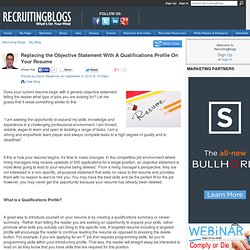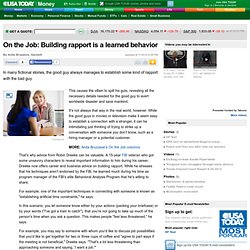

Replacing the Objective Statement With A Qualifications Profile On Your Resume. Does your current resume begin with a generic objective statement telling the reader what type of jobs you are looking for?

Let me guess that it reads something similar to this: “I am seeking the opportunity to expand my skills, knowledge and experience in a challenging professional environment. I am honest, reliable, eager to learn and open to tackling a range of tasks. I am a strong and empathetic team player and always complete tasks to a high degree of quality and to deadlines” If this is how your resume begins, it’s time to make changes. What is a Qualifications Profile? A great way to introduce yourself on your resume is by creating a qualifications summary or career summary. How long should my Qualifications Profile be? The last thing you want to do is turn your qualifications profile into an essay! Final Thought: When you begin to write your new resume, don’t forget the number one rule. On the Job: Building rapport is a learned behavior. In many fictional stories, the good guy always manages to establish some kind of rapport with the bad guy.

This causes the villain to spill his guts, revealing all the necessary details needed for the good guy to avert worldwide disaster and save mankind. It's not always that way in the real world, however. While the good guys in movies or television make it seem easy to establish a connection with a stranger, it can be intimidating just thinking of trying to strike up a conversation with someone you don't know, such as a hiring manager or a potential customer. MORE: Anita Bruzzese's On the Job columns That's why advice from Robin Dreeke can be valuable. For example, one of the important techniques in connecting with someone is known as "establishing artificial time constraints," he says. Dreeke, author of the self-published It's Not All About 'Me,' available through Amazon, says other quick rapport techniques that can be helpful include: Slowing down.
Remembering it's not about you. Nail the Interview! 10 Things You Need To Know About Your Job Interviewer. Career Search Insights Your College Never Gave You. At this time of year my mailbox is filled with resumes from college seniors looking for their first real job and begin their career.

The sad truth is that all of those resumes go directly into the garbage, for two reasons: This is not an efficient way for me to hire employees, and I believe people who simply send out unsolicited resumes are not really serious about their career. It’s not that I’m a stickler for proper job-hunting protocol. In fact, over the years I’ve hired four people who simply showed up at my office without an appointment, requesting to tell me how and why they would make a good member of my team. These are the type of prospective employees whose resumes I do read. If how I’m approached by most college seniors provides any insight, then most colleges are failing to prepare students for serious job hunting and career building.
Be Aggressive.Don’t send out resumes and expect people to call you. Got any career search insights you can share with us? Photo by Anna Gay. Interview Questions. 3 Interview Questions You Must Ask. How Recruiters Use Social Networks to Screen Candidates. Over the past few years, we've seen social media used in the job market in a number of ways — startups, small businesses and large corporations alike are diving into the socialverse to find top talent, and job seekers are likewise getting creative with social media.

Social media monitoring service Reppler recently surveyed more than 300 hiring professionals to determine when and how job recruiters are screening job candidates on different social networks. The study found that more than 90% of recruiters and hiring managers have visited a potential candidate's profile on a social network as part of the screening process. And a whopping 69% of recruiters have rejected a candidate based on content found on his or her social networking profiles — an almost equal proportion of recruiters (68%), though, have hired a candidate based on his or her presence on those networks. Every week we post a list of social media and web job opportunities. Infographic courtesy of Reppler.